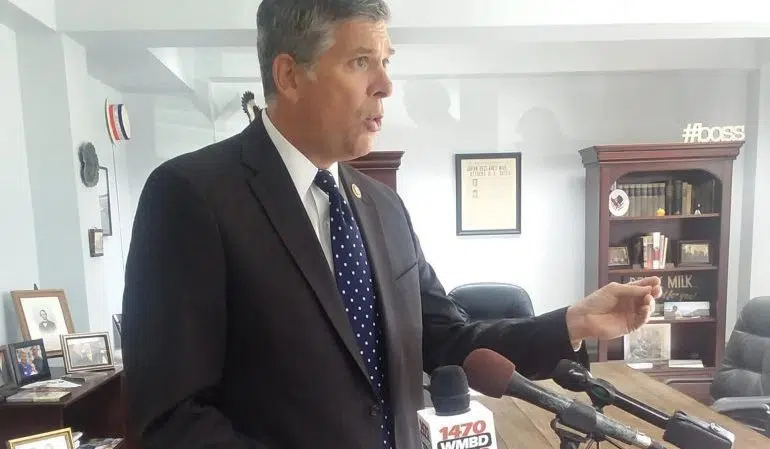PEORIA, Ill. — Illinois Senate Democrats are asking the federal government for more than $41 billion in the next coronavirus relief plan. The request includes $10 billion for a pension fund bailout.
In response to a letter from Illinois Senate President Don Harmon, a group of Illinois’s Republican Congressional leaders said they’ll fight for more aid to support the state and local governments, but not beyond the scope of the COVID-19 crisis.
Rep. Darin LaHood, who represents Illinois’ 18th District, said Harmon has requested a “full-scale federal bailout.”
“We don’t want to give some big lump of stimulus money to the State of Illinois and have it never go out the cities and municipalities,” LaHood said.
LaHood told WMBD’s Greg and Dan Congress will work to provide federal resources for Illinois, but the state must withdraw the proposed Graduated Income Tax increase plan that’s set to go to the voters in November.
LaHood suggested giving money for municipalities directly to those places rather than writing a check to the State of Illinois.
“Let’s give money directly to the City of Peoria. Let them decide how to spend the money the best way that they can, so we don’t have to lay off 50 police and firemen in Peoria,” he said.
LaHood said COVID-19 hasn’t caused Illinois’s pension crisis, but it has pointed out how vulnerable the state really is.
“We’re not confident in the federal government giving a big bunch of money to the State of Illinois with no strings attached.”
In order to provide more relief, Illinois’s Republican members of Congress are asking the state to reform its pension system to reduce long-term liabilities and reduce State and local spending.
The full letter to Illinois Senate President Don Harmon is attached below:
April 20, 2020
The Honorable Don Harmon
Senate President
State of Illinois
327 State Capitol
Springfield, Illinois 62706
Dear President Harmon:
Thank you for your letter-it’s imperative that all of us in government, whether at the federal, state, or local level, put the people of Illinois first and focus on initiatives and aid that help our
families, students, workers, and employers get through this crisis.
Congress has taken unprecedented action to address this crisis. First, by passing $8.3 billion emergency funding for testing, treatment, and tele-health.
In the second package, the Families First Coronavirus Response Act, we included extended sick leave for individuals forced to stay
at home as we aimed to stop the spread. And most recently, Congress passed the largest relief package in the history of the United States, the Coronavirus Aid, Relief, and Economic Security (CARES) Act, with $2.2 trillion in relief payments to individuals and families, forgivable loans to small businesses, extension of unemployment benefits, and $140 billion for hospitals and medical procurement.
Congress has provided significant aid to state and municipal governments to help defray the costs being incurred and help the people of Illinois. We fought for and obtained nearly $4.9 billion in funding for the State of Illinois in the CARES Act.
According to the Illinois Comptroller’s website, as of the writing of this letter, the State has spent $171 million of the appropriated money. We would like to work with you to ensure Illinois is equipped to manage and distribute the appropriated CARES Act funding and will seek to provide more flexibility for ways in which states and localities can utilize these funds.
We also will work to set a specific date for the Federal Medicaid Assistance Percentage (FMAP) increase that was established in the
Families First Act.
The U.S. Treasury has already exhausted the $350 billion authorized for the Payment Protection Program (PPP), which was originally intended to last until July 2020 to help cover the salaries and benefits of small business employees who would likely otherwise lose their jobs.
Congress needs to act now to provide additional resources for this important and innovative program that’s protecting the employment of millions of Americans.
We will fight for more aid to support the state and local governments in Illinois, but your letter assumes the federal government will approve aid that is beyond this immediate crisis.
For example, you suggest the State’s revenue loss will be approximately $14.1 billion, but your letter requests aid that is many multiples of the State’s loss projections.
We fully support federal assistance to help defray some of the State’s losses, but we oppose using the crisis as an opportunity for a full-scale federal bailout.
Your letter sets forth the fundamental structural problems in Illinois, and we believe these problems will only be exacerbated without long term solutions:
“In a normal year the size of those [pension] payments crowds out funding for services and programs. Clearly this will not be a normal year and that crowding out effect will be exacerbated by significant revenue losses.”
We agree that this is happening but believe that it reflects a fundamental problem with State policy:
The promises made in the past, and still today, are inhibiting Illinois’ growth and prosperity for the future. Even in the best economic climate, with some of the highest taxes in the nation, Illinois could not afford its obligations.
This pandemic has not caused a pension crisis, it has further illuminated the one that already existed.
Similarly, the sole justification for your requested $9.6 billion for Illinois municipalities is:
“Those [revenue] losses will dramatically impact municipalities’ abilities to fund retirement systems” for municipal workers.
While we honor and celebrate the service of our first responders, their service in this crisis will not convince representatives of other states to pay for pension plans that Illinois has mismanaged.
It is imperative that Illinois’ State and local leadership step up and address the preexisting financial mismanagement that makes our State and localities particularly vulnerable to the fiscal impacts of this pandemic.
We will work with you to provide more federal resources, but we
need the State to address the longstanding issues exacerbated by this crisis:
Illinois must reform its pension system to reduce long-term liabilities and make the system more equitable to the people of Illinois before federal money is used to support the pension system.
Illinois must reduce State and local spending and make the government more flexible and
responsive to the people.
Illinois must reduce spending mandates on local governments in order to provide the same flexibility the State is seeking for the use of federal dollars.
Illinois must withdraw the Graduated Income Tax increase to protect Illinois jobs that are already at risk from the pandemic and to stem the exodus of people and opportunity from our great State.
As we continue working on providing relief for American families, workers, hospitals and businesses, we hope you will cooperate with us to make Illinois healthy again.
The American people have shown steady resolve and a remarkable spirit during this pandemic and we are confident their fortitude will lead us out of this crisis.
We look forward to working with you as we begin this next phase. Thank you for your consideration.
Sincerely,
Adam Kinzinger (Member of Congress Illinois’ 16th District)
John Shimkus (Member of Congress Illinois’ 15th District)
Rodney Davis (Member of Congress Illinois’ 13th District)
Mike Bost (Member of Congress Illinois’ 12th District)
Darin LaHood (Member of Congress Illinois’ 18th District)








